William Wyler’s The Heiress (1949): Criterion Blu-ray review
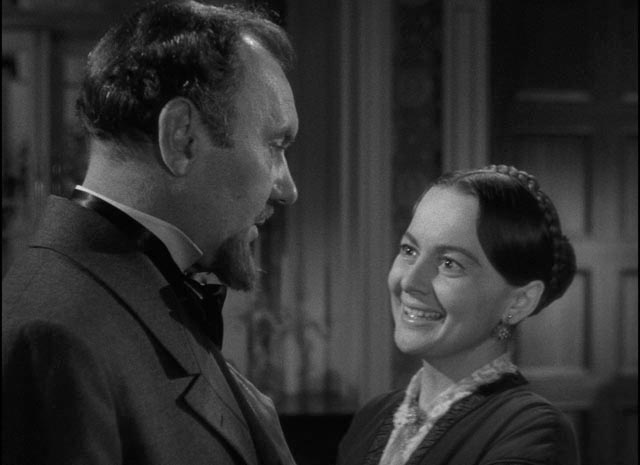
“If you want to send a message, call Western Union.”
This quote, in various forms, has been variously attributed to producer Samuel Goldwyn, director Frank Capra, playwright Moss Hart, even Humphrey Bogart, but whoever said it first it stands as one of the tenets of classical Hollywood. The movies, it was held (and in certain quarters still is held), are about entertainment, a diversion from real life. Audiences don’t want to be lectured, so keep your politics and social commentary out of it.
Of course, as we’ve long known, it’s impossible to do that. Every story we tell, whether implicitly or explicitly, contains the seeds of a worldview, either in support of or critical of the society in which it was created. One of the purposes of the classic studio style was to disguise this as much as possible; the inner workings of a story had to be smoothed over and hidden by seamless editing which carried the audience from point to point without leaving space to question the underlying meanings – in other words, there was an often unspoken imperative to reinforce the status quo. A movie might offer illicit thrills – like the great gangster movies of the 1930s – but in the end, the audience would be brought back to an appreciation and acceptance of social norms from which the deviations displayed were only temporary.
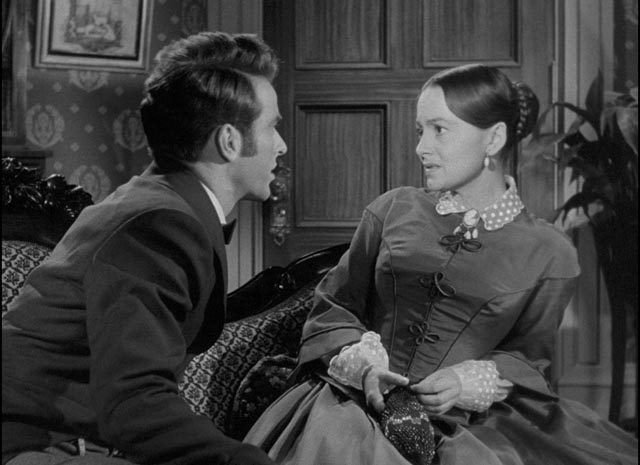
Like any only partially articulated idea, this attempt to conceal far more complex and nuanced social forces could never be complete and the unacceptable would often show through the cracks. People flocked to those gangster movies for the frisson of rebellion, not for the restoration of order which came in often perfunctory endings. And in the hands of a good filmmaker, deeper critiques of the status quo might escape studio constraints.
It would be hard to find a director who embodied the studio style better than William Wyler. A perfectionist craftsman, Wyler made films with deceptively smooth surfaces, submerging himself behind story and character, foregrounding the performances of his movies’ stars. Critic Robin Wood dismissed his work as “archetypally bourgeois” – an accusation superficially merited if you judge by the source material of many of his films; adaptations of successful plays and middlebrow novels. In four years, he could go from the scathing Detective Story (1951) to the Dreiser adaptation Carrie (1952) to the romantic fluff of Roman Holiday (1953) to the tense mixture of family melodrama and crime in The Desperate Hours (1955). This range seems to signal the quintessential studio director, taking on assignments as they are presented to him.
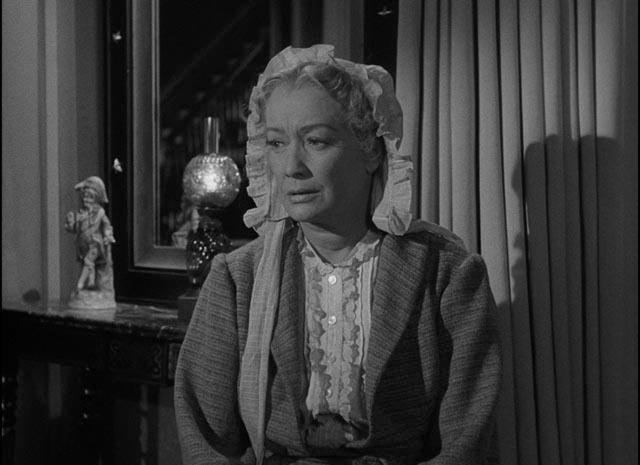
But what they (and many other of his films) have in common is a fascination with human behaviour and the ways in which characters collide and affect one another in clearly drawn social contexts. And more distinctly, Wyler had developed a style which provided the perfect ground on which these conflicts might be played out. He was one of the masters of creating a visual field within which the action occurs, a use of deep space within which the constantly fluctuating physical relationships of the actors take on social and psychological meaning (in short, mise-en-scene). This style attained its apotheosis in The Heiress (1949), an adaptation of Henry James’ 1880 novel Washington Square by way of the successful 1947 stage version of Ruth and Augustus Goetz (who also wrote the script for the film).
This film with its stellar cast and impeccable craft is not only Wyler’s finest achievement – it’s the most devastating depiction of domestic warfare ever to come out of a Hollywood studio (Paramount) and a savage critique of the ways in which money deforms human relationships and shatters lives. A domestic melodrama centred on a conflict between father and daughter, it ends as an acid critique of a society in which meaning is rooted in money – that is, a critique of the essential identity of American society. In other words, embedded within a prestige literary adaptation, Wyler presented the audience with a very pointed and powerful message.
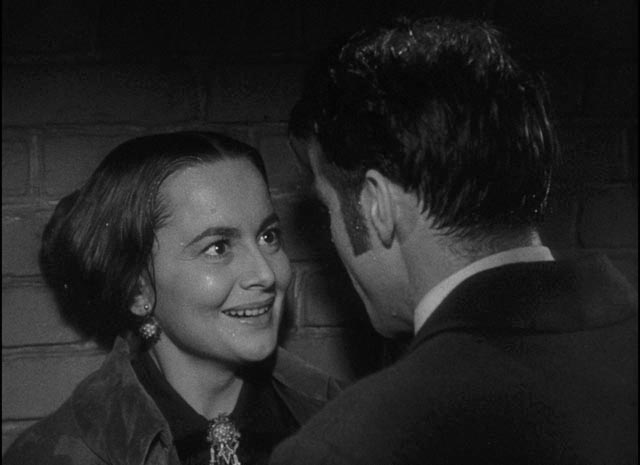
On its surface, The Heiress is everything a prestige studio product could hope to be, with its literary pedigree and box-office friendly stars. Olivia de Havilland was a five-time Oscar nominee, and two-time winner (the second for The Heiress); co-star Montgomery Clift would go on to four Oscar nominations; Ralph Richardson was a distinguished British stage and film actor who had been gaining an international reputation (particularly for his performance in Carol Reed’s The Fallen Idol [1948]) – he too would garner an Oscar nomination for his performance in The Heiress, his first Hollywood movie.
De Havilland plays Catherine Sloper, the daughter of a prominent New York physician, Dr. Austin Sloper (Richardson). She has $10,000 a year from her mother and is due for another $20,000 a year when her father dies. As the title indicates, her identity has been wrapped up since birth with this wealth. The money ought to make her a desirable catch, but she is painfully shy and socially awkward. The roots of her insecurity are very quickly made apparent as we see that the charming and poised Dr. Sloper has subtly – and not always so subtly – waged a lifelong campaign to crush her spirit. Having raised his dead wife on an impossibly high pedestal, his daughter no matter what her personal attributes can never equal what he has lost. (Although it’s never mentioned in the film, in the source novel it is clear that Mrs. Sloper died in childbirth; Sloper has spent his life punishing Catherine for a crime for which she has no culpability – it’s to the adaptation’s credit that it doesn’t spell this out, avoiding such crude psychologizing in favour of more subtle emotional nuances.)
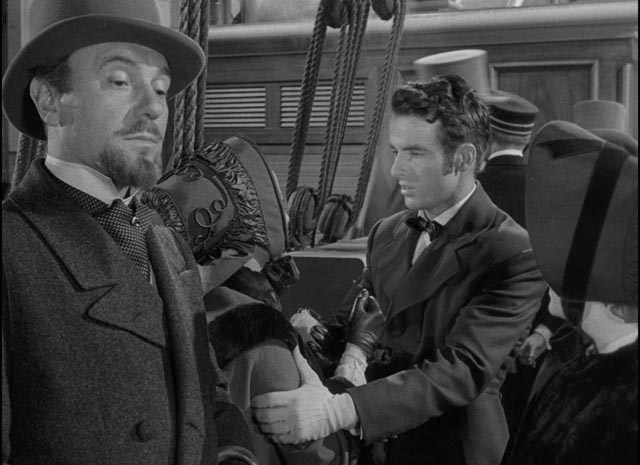
Attending a society party with her father, Catherine is approached by a handsome and charming young man, Morris Townsend (Clift). She is both flustered and charmed by his attentions, and he appears to be charmed by her awkward shyness. He begins to call on her at home, wooing her – and despite her insecurity, she falls in love with him. But there is a problem: Morris is essentially penniless. Dr. Sloper smells opportunism – a handsome yet poor young man attaching himself to a shy and unattractive young woman with money. When Catherine defies Sloper and plans to elope with Morris, the doctor informs her that he will disinherit her. This means she will be stuck with just her mother’s $10,000 a year. This is still a lot of money, but far from the anticipated $30,000 a year. When she tells Morris, he flees, leaving her with her bags packed, abandoned.
Years pass and eventually Morris returns – suspiciously only after Dr. Sloper’s death and the fulfillment of the inheritance. He once again professes his love and tells Catherine that he ran away to spare her the loss of her due, that he could not be responsible for her losing the inheritance. Catherine allows him to court her again, only to inflict on him the same pain he once inflicted on her. When confronted by her sympathetic aunt Lavinia (Miriam Hopkins), Catherine delivers the film’s most chilling line (original to the script): “Yes, I can be cruel. I have been taught by masters.”
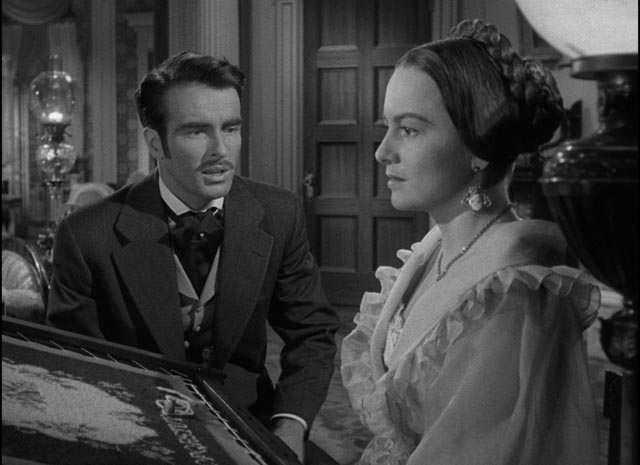
The power of the film’s ending derives from the subtlety with which Wyler and his cast have treated the complex relationships among these three characters. In Jean Renoir’s famous words: “The truly terrible thing is that everybody has their reasons.” All three are charming and attractive – until they inflict pain on one another, driven by their own fears and pain. Here is where Wyler’s skill shows most clearly: he can convey great depths of psychological meaning through camera placement and the blocking of the actors within a scene, never needing to spell things out through expository dialogue. The characters must interpret each other’s motives and are prone to errors which may reflect harmfully on themselves.
Sloper has been unable to love his daughter because he has never been able to let go of his grief over the loss of his wife; and yet in purely material terms he is concerned with her well-being. Morris, who has a fairly casual view of money, may well be sincere in his concern about Catherine losing part of her inheritance – or he may be upset at losing the prospect of an additional $20,000 – and either way, he may well be genuinely attracted to her. And Catherine, lonely and unable to please the man who has controlled her entire life, doesn’t care whether Morris is sincere or not; she’s willing to accept even feigned expressions of love because they’ll be better than her father’s quiet cruelty. For her, Morris’ real crime is his failure to be sincere in his insincerity.
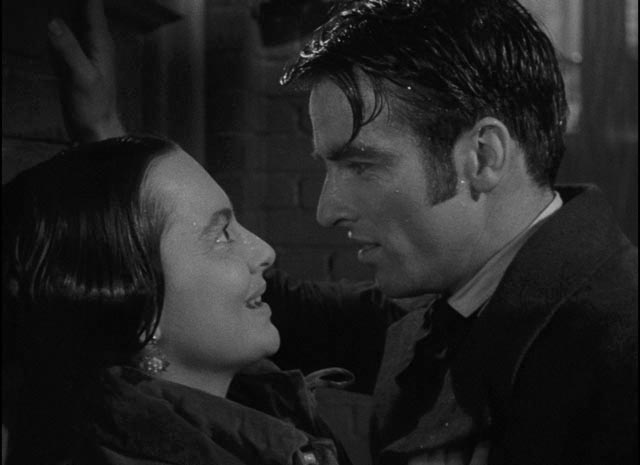
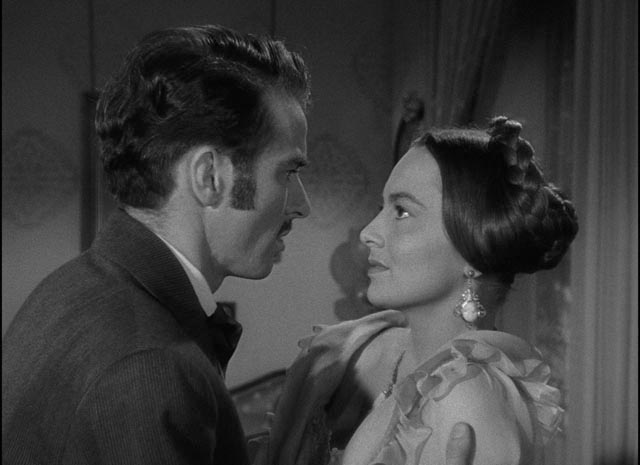
Wyler’s staging has remarkable precision while never seeming to constrain the actors to make his thematic points. While he seldom moves the camera, every scene is sustained by dynamic tensions evoked by body language, glances, shifting physical relationships. He uses potentially trite strategies with genuine expressive power: mirrors play a part at key moments, simultaneously connecting and separating characters in the frame; and no filmmaker (even Hitchcock) has made better use of staircases. Each major emotional development in the story is punctuated with shots either up or down the Sloper house’s tall, narrow staircase which separates the private space of Catherine’s bedroom from the more communal family spaces below. Upstairs, with her aunt Lavinia, Catherine has a lightness and confidence which evaporates as she descends to rooms dominated by her father.
The key contrast lies between her ascent after being jilted by Morris, crushed, barely able to drag herself up (in the play, she has a monologue to express her shattered feelings; here, Wyler expresses it all in a single silent shot), and her chillingly confident ascent at the end after returning him the favour, leaving him alone and desperate. She has finally found an inner strength long denied her by her dependence on the opinions of men; but it has come at extreme emotional cost. Her full inheritance is not simply the money, but also a hardness which guarantees that she will remain alone in possession of this opulent home where she has spent most of her life in fearful uncertainty.
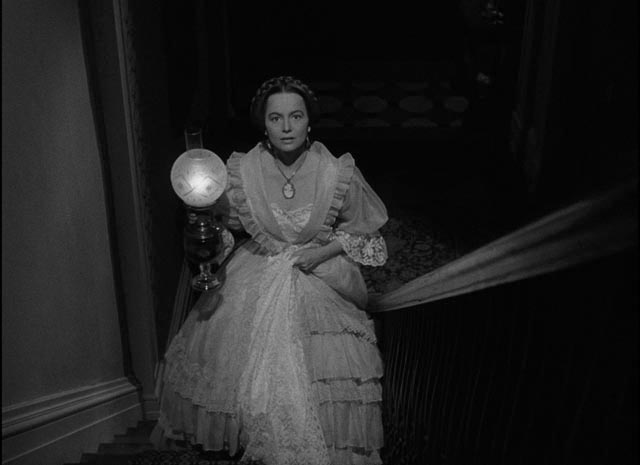
At the time of release and subsequently, there have been criticisms aimed at The Heiress for Wyler’s casting choices. (Wyler himself was ambivalent.) It’s said that Olivia de Havilland was simply too beautiful to play the wallflower Catherine; that Montgomery Clift was too handsome and charming to embody Morris. (Apparently in the stage version, Morris was something of a moustache-twirling villain.) To me, these criticisms seem misguided. Catherine is only unattractive because that image has been imposed on her by her father, for whom she can never be good enough. Her status as wallflower derives from her crushed spirit; it seems facile to insist that she must really be plain – yet another standard Hollywood trope – and de Havilland does a remarkable job of turning the character in on herself, as if perpetually hiding from view.
As for Clift, his inherent charm as Morris is essential to sustain the ambiguity of his motives. We can never know whether he has genuine feelings for Catherine or is simply after her money; the point is that this is irrelevant to Catherine herself. She’ll happily accept him either way because his expressions of affection are an antidote to her father’s cruelty disguised as concern for her well-being. In lesser hands, The Heiress could have been a cliched expression of melodramatic archetypes; but with this cast and director, it becomes a complex, genuinely upsetting examination of the ways in which money distorts character and human relationships. It’s one of the true masterpieces of the studio system, uncompromised by the kind of commercial considerations which so often insisted on a “happy ending” — a lesser filmmaker could so easily have ruined it by finding a way for Catherine and Morris to live happily ever after.
*
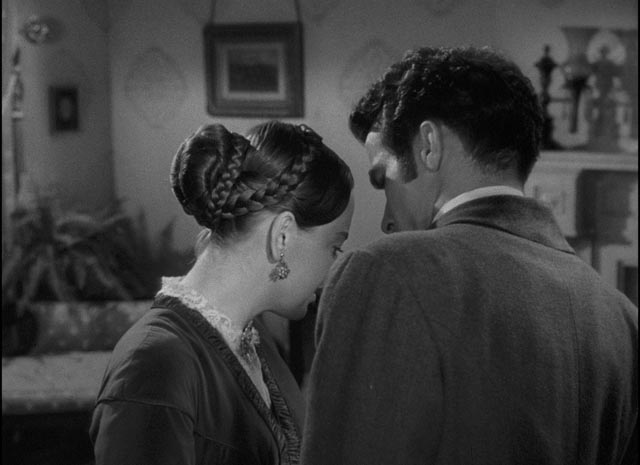
The disk
Criterion’s Blu-ray uses a 4K restoration from a 35mm duplicate negative and the image is gorgeous, richly detailed with strong contrast which brings out the expressiveness of Leo Tover’s photography. The mono sound has also been restored, with clear dialogue and a strong presentation of Aaron Copland’s (sparely used) score.
The supplements
Criterion include just over two hours of new and archival extras, beginning with a conversation between screenwriter Jay Cocks (Age of Innocence among others) and critic Farran Smith Nehme (22:46) in which they discuss the film’s relationship to the source novel and the stage adaptation. There’s a television interview with de Havilland from 1986 (44:59) and parts of a Wyler tribute on the Merv Griffin Show from 1973 (16:41) featuring Wyler, de Havilland, Bette Davis and Walter Pidgeon; Wyler’s acceptance speech from a 1976 AFI tribute (5:35); a 1981 interview with Richardson shot for the documentary Directed by William Wyler (7:09); plus two pieces focused on costume designer Edith Head – a restored 1950 short called The Costume Designer (8:58) and an interview with collector and historian Larry McQueen (15:01). An original trailer (2:50) emphasizes the prestige quality of the production.
The booklet essay is by critic Pamela Hutchinson.
Comments